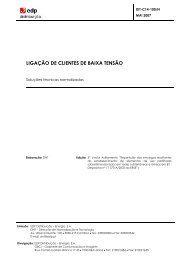business plan for 2004 - EDP
business plan for 2004 - EDP
business plan for 2004 - EDP
You also want an ePaper? Increase the reach of your titles
YUMPU automatically turns print PDFs into web optimized ePapers that Google loves.
Following the sustained rise in 2002, which allowed the<br />
Euro to break through parity with the dollar, the<br />
European currency remained higher than the North<br />
American dollar throughout 2003. The per<strong>for</strong>mance of<br />
the euro against the dollar in 2003 was marked by a<br />
sustained increase, driven by the reduction of the Fed<br />
Funds rate in the United States. Following this<br />
appreciation of the euro, an historic exchange rate of<br />
$1.26 was achieved on the last day of 2003.<br />
According to the most recent <strong>for</strong>ecasts, the North<br />
American economy grew by around 3.0% in 2003,<br />
strengthening the signs of recovery seen in 2002 and<br />
underpinned by the success of expansionist fiscal and<br />
monetary policies. A growth of around 4.0% can be<br />
expected <strong>for</strong> <strong>2004</strong>, with the North American economy<br />
continuing to head the recovery of the developed<br />
economies.<br />
The Euro Area has experienced ongoing difficulties in<br />
making a start to the upturn of economic growth and in<br />
accompanying North American dynamism. Following a<br />
growth of 0.9% in 2002, the growth rate of the Euro Area<br />
in 2003 stood at just 0.5%, with a practically zero<br />
contribution by the main economies, France and<br />
Germany. With domestic demand lower than could be<br />
desired, the appreciation of the euro did not help exports,<br />
while the budget restrictions in several countries<br />
prevented expansionist policies. Greater economic<br />
dynamism is now expected in <strong>2004</strong>, though significantly<br />
lower than that <strong>for</strong>ecast <strong>for</strong> the United States.<br />
Japan, which has seen modest economic growth during<br />
the past two years, achieved considerably better<br />
economic per<strong>for</strong>mance in 2003, 2.7% according to the<br />
OECD <strong>for</strong>ecasts. The Japanese economy is expected to<br />
per<strong>for</strong>m well in <strong>2004</strong> even though at a more modest<br />
rate than in 2003, together with stabilisation of<br />
unemployment. However, the deflationary tendency<br />
that has marked the evolution of prices in recent years<br />
will continue. An improvement of economic conditions<br />
can be expected in the other Asian countries in <strong>2004</strong>, on<br />
a par with the evolution of the North American<br />
economy and after the effects of the Acute Respiratory<br />
Syndrome epidemic have been left behind.<br />
Following a particularly troubled year, economic growth<br />
in Latin America in 2003 was limited by the weak<br />
per<strong>for</strong>mance of its leading economies, Mexico and<br />
Brazil, and by the deep recession in Venezuela that was<br />
expected as a result of the political and economic<br />
troubles that marked the beginning the year. On the<br />
contrary, Argentina per<strong>for</strong>med well following a period<br />
of sharp instability. The prospects <strong>for</strong> <strong>2004</strong> are more<br />
optimistic, suggesting greater stability of the main<br />
economies of this region.<br />
To sum up, following a period of slowing economic<br />
growth exacerbated by the effects of the September 11<br />
attacks, this tendency had been expected to be reversed<br />
in 2002, while 2003 was to have been a year marked by<br />
more sustained growth worldwide. Nevertheless,<br />
several factors, particularly the military intervention in<br />
Iraq, compromised these expectations to some extent,<br />
postponing them to <strong>2004</strong>.<br />
>> 2 Iberian Economy<br />
>> 2.1 Portugal<br />
Continuing the tendency of recession begun in 2002, the<br />
Portuguese economy once again diverged from the Euro<br />
Area, declining by about 1.0% in 2003, compared with a<br />
growth of 0.4% in 2002. The Portuguese economy<br />
continued to be affected by the international situation, in<br />
particular by the evolution seen in the Euro Area, with<br />
weaker domestic demand and budget restrictions<br />
preventing expansionist measures. As a result of some<br />
positive signs during the last months of the year, the<br />
most recent predictions suggest an upswing of the<br />
Portuguese economy in <strong>2004</strong>, with an end to the<br />
recession and with economic growth, even though<br />
below the European average.<br />
The recession of the Portuguese economy, the decline of<br />
domestic demand in particular, allied to wage<br />
moderation and to the effect of the appreciation of the<br />
euro on imports, has helped to contain price increases.<br />
The Harmonised Index of Consumer Prices (HICP),<br />
which declined to 3.3% in 2003 from 3.7% in 2002, is,<br />
however, significantly higher than the European<br />
average.<br />
While the per<strong>for</strong>mance compared with 2002 was<br />
favourable as far as prices are concerned, the same<br />
cannot be said of employment. The unemployment rate<br />
in Portugal, despite the fact that it is one of Europe’s<br />
lowest, stood at 5.1% in 2002, increasing in 2003 to a<br />
figure of around 6.5%. The <strong>2004</strong> <strong>for</strong>ecasts suggest a<br />
slight deterioration of this indicator, though it will<br />
remain below the European average.<br />
>> 2.2 Spain<br />
Following a slight slowdown of the growth of the<br />
Spanish economy in 2002, the leading projections<br />
suggest a growth of between 2.2% and 2.3% in 2003. If<br />
this is confirmed, it will be one of the best per<strong>for</strong>mers of<br />
the European economies, significantly above the Euro<br />
Area average and better than seen in 2002, despite the<br />
international context and especially the European<br />
64/65

















